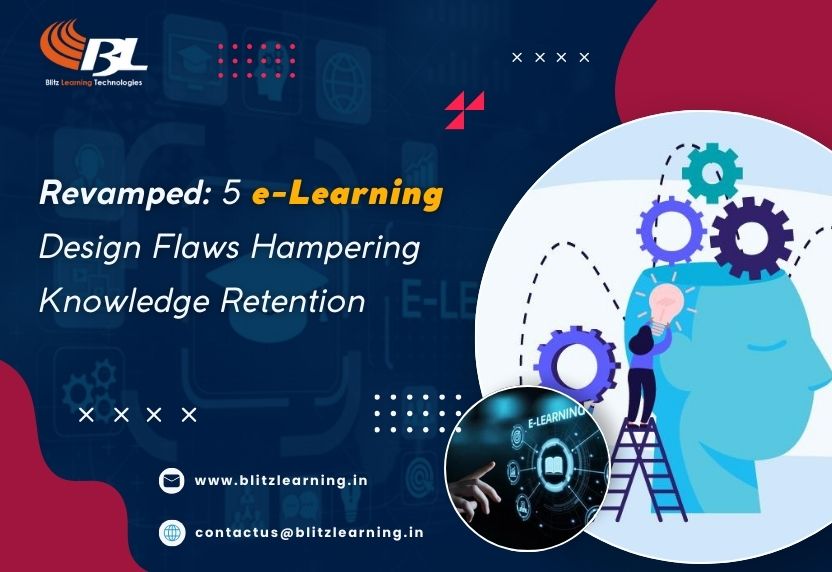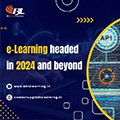
Blog
- Home
- Blog

19Mar
Revamped: 5 eLearning Design Flaws Hampering Knowledge Retention
Introduction :
In an era where digital platforms dominate the educational landscape, eLearning has emerged as a pivotal tool for knowledge dissemination. From corporate training to academic courses, the flexibility and accessibility offered by eLearning platforms have revolutionized learning paradigms. However, despite its widespread adoption, many eLearning initiatives fall short in achieving their primary objective: ensuring effective knowledge retention.
While technological advancements continue to enhance the eLearning experience, a critical examination reveals persistent design flaws that undermine retention rates. By identifying and addressing these flaws, educators and instructional designers can transform eLearning into a potent vehicle for long-term learning outcomes. Let's delve into five revamped eLearning design flaws that hamper knowledge retention:
Passive learning interfaces:
Traditional eLearning modules often rely on passive learning interfaces, where learners passively consume content without active engagement. This one-way flow of information fails to stimulate critical thinking and meaningful interaction, resulting in shallow comprehension and poor retention. To revamp this flaw, eLearning platforms should embrace interactive elements such as quizzes, simulations, and scenario-based exercises. By encouraging active participation, learners are more likely to retain information and apply it in real-world scenarios.

Lack of personalization:
One-size-fits-all eLearning courses often overlook the diverse learning needs and preferences of individuals. Without personalized learning paths, learners may feel disengaged or overwhelmed, leading to diminished retention rates. To address this flaw, eLearning platforms can leverage adaptive learning algorithms that tailor course content and pacing based on each learner's proficiency and learning style. By catering to individual needs, personalized eLearning experiences empower learners to maximize retention and mastery of complex concepts.

Fragmented learning experiences:
eLearning modules are frequently fragmented, with disjointed content scattered across multiple modules or platforms. This fragmentation disrupts the continuity of learning and hampers knowledge retention by preventing learners from forming cohesive mental frameworks. To combat this flaw, educators should adopt a holistic approach to course design, organizing content into logical sequences and providing comprehensive learning resources within a unified platform. Seamless integration of multimedia elements and progress tracking features further enhances the coherence of the learning experience, facilitating long-term retention.

Limited interactivity and feedback:
Static presentations and text-heavy materials dominate many eLearning courses, offering limited interactivity and feedback mechanisms. Without opportunities for active engagement and timely feedback, learners struggle to gauge their understanding and address misconceptions effectively. To overcome this flaw, eLearning designers should incorporate dynamic multimedia elements, interactive simulations, and peer collaboration features into course modules. Real-time feedback mechanisms, such as instant quizzes and performance analytics, empower learners to assess their progress and make informed adjustments to their learning strategies, fostering deeper understanding and retention.

Neglecting emotional engagement:
Effective learning is not solely about acquiring knowledge; it also involves emotional engagement and motivation. However, many eLearning initiatives neglect the emotional aspect of learning, failing to inspire curiosity, enthusiasm, and perseverance in learners. To rectify this flaw, eLearning platforms should integrate storytelling, gamification, and motivational prompts into course content to captivate learners' attention and cultivate a positive learning environment. By tapping into learners' intrinsic motivations and fostering a sense of achievement, emotionally engaging eLearning experiences enhance retention and sustain long-term learning outcomes.

Conclusion:
While eLearning holds immense potential for knowledge dissemination, its effectiveness hinges on addressing inherent design flaws that impede retention rates. By revamping eLearning interfaces to prioritize active engagement, personalization, coherence, interactivity, and emotional engagement, educators can unlock the full transformative power of digital learning environments. Embracing these principles not only enhances knowledge retention but also cultivates a culture of lifelong learning and empowerment in today's dynamic educational landscape. As we continue to navigate the digital frontier of education, let us strive to create eLearning experiences that inspire, empower, and endure.

Neha Tyagi
About authorAs a Digital Tech professional with significant experience, Neha Tyagi has mastered the art of teamwork. Throughout her career, she maintains a commitment to continuous learning. Currently, Neha is delving into innovative technologies aimed at transforming businesses.



Leave a comments